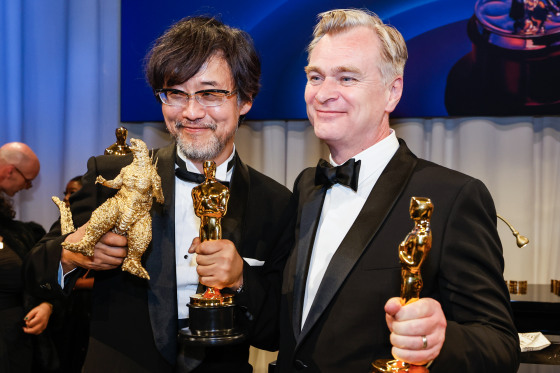Following his historic Oscar win, the director of “Godzilla Minus One,” which deals with the devastation of the atomic bombings of Japan in World War II, responded to a question about his thoughts on “Oppenheimer,” a portrayal of the American scientist responsible for the deadly weapon.
“As a person of Japanese ancestry and descent, my response to ‘Oppenheimer’ [is that] I would like to dedicate a different film to that when that day comes,” Takashi Yamazaki — whose film won the Oscar for best visual effects, the first for the “Godzilla” franchise — told reporters at the Academy Awards on Sunday.
“Godzilla Minus One,” the 37th installment of the iconic Toho Studios franchise, follows civilians in postwar Japan as the monster re-emerges amid their grief. The monster itself, experts say, was originally created as a metaphor for the ills of atomic weapons and testing, with its heavily furrowed skin or scales imagined to resemble the keloid scars of the Japanese survivors of the two atomic bombs.
“Oppenheimer” dominated the Oscars with seven wins for its portrayal of physicist J. Robert Oppenheimer, director of the clandestine weapons lab in Los Alamos, New Mexico, which was part of the top-secret U.S. effort to make the first atomic bomb. But the film also got mixed reactions for its erasure of the hundreds of thousands of Japanese victims of Oppenheimer’s creation.
Nolan said he chose not to illustrate the aftermath of the bombings or the victims because “to depart from Oppenheimer’s experience would betray the terms of the storytelling.”
“He learned about the bombings of Hiroshima and Nagasaki on the radio — the same as the rest of the world,” Nolan said in a discussion with NBC News’ Chuck Todd. “That, to me, was a shock. … Everything is his experience, or my interpretation of his experience. Because as I keep reminding everyone, it’s not a documentary. It is an interpretation. That’s my job.”
Yamazaki told reporters that the simultaneous success of the two films and the “juxtaposition was not intentional.”
“As we were making the film, the state of the world and the geopolitical scene has changed quite a bit. It almost feels fated that both of these films were released in the same year,” he said.
